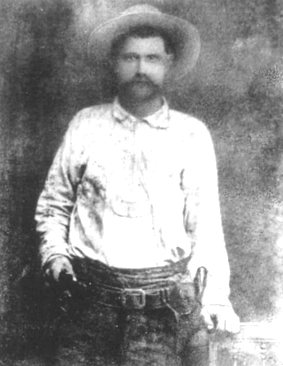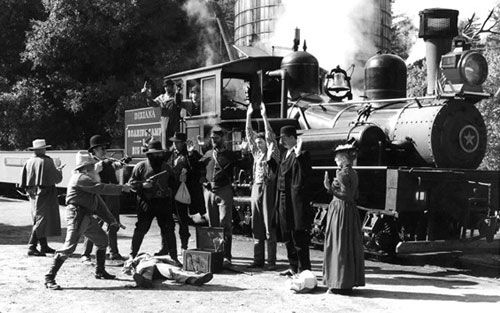
The Iron Horse’s Shadow: Brack Cornett, Texas’s Forgotten Train Robber
In the twilight years of the 19th century, as the American frontier began to recede into myth and memory, a new symbol of progress and prosperity cut across the vast plains and burgeoning towns: the railroad. But with this advance came a new target for the lawless, a gleaming, vulnerable artery of wealth ripe for plunder. While names like Jesse James and Butch Cassidy became etched into the national consciousness, many other outlaws rode the dusty trails, leaving their own bloody, less-remembered stains on history. One such figure was Brack Cornett, a Texas train robber whose career, though not as widely celebrated in folklore, offers a stark, journalistic glimpse into the brutal realities of the Old West’s final throes.
Brack Cornett was no folk hero. He was a hardened criminal, a product of a harsh land and a tumultuous era, who found his calling in the dangerous, high-stakes game of intercepting the iron horse. His story is not one of romanticized rebellion, but of calculated risk, fleeting success, and the relentless grind of the law, painting a vivid picture of a Texas caught between the wild past and an encroaching, ordered future.
The Landscape of Opportunity: Texas in the Late 1800s

To understand Brack Cornett, one must first understand the Texas of his time. The state, still reeling from the Civil War and Reconstruction, was a land of immense opportunity and equally immense lawlessness. Vast cattle drives, burgeoning oil fields, and rapidly expanding railroad networks brought wealth, but also attracted those eager to seize it by force. The railroads, in particular, were a double-edged sword. They connected distant communities, facilitated commerce, and symbolized progress, yet their isolated tracks, predictable schedules, and valuable cargo—ranging from gold shipments to payrolls and mail—made them irresistible targets for gangs willing to risk all.
"The railroads were the arteries of the new American economy," noted historian Dr. Clara Belle Smith in a recent lecture on Texas outlaws. "And just like any artery, they were vulnerable. For a man like Cornett, who perhaps saw himself as outside the system, they represented a direct challenge, an easy score, and a way to live outside the emerging norms of society."
Cornett’s exact origins remain somewhat murky, a common characteristic of many outlaws of the period who preferred to keep their pasts veiled. What is known is that by the 1890s, he had firmly established himself in the criminal underworld of Texas, operating in the central and eastern parts of the state. He was not a lone wolf, but often worked with a small, shifting band of accomplices, a common practice that offered both shared risk and increased firepower.
The Modus Operandi: Stopping the Iron Horse
Train robbery was a specialized craft, requiring a blend of audacity, planning, and often, brute force. Cornett and his gang perfected their own chilling routine. Typically, they would choose a remote stretch of track, often near a curve or an uphill grade where the train would naturally slow. There, they would signal the engineer to stop, sometimes by placing an obstruction on the tracks, other times by simply appearing, masked and armed, along the right-of-way.
Once the train ground to a halt, the real work began. The express car, which carried valuable shipments and safes, was the primary target. The express messenger, a brave and often heavily armed individual, was usually ordered out. If the safe could not be opened with threats or by forcing the messenger, dynamite was the next resort. The sound of a safe being blasted open in the dead of night, echoing across the Texas plains, became a terrifying symphony of the era. Passengers, though often terrified, were usually left unharmed, the robbers’ focus being on the train’s valuable cargo rather than individual possessions. This, however, was not always the case, and the line between a "professional" robbery and a random act of violence was often thin.
One of Cornett’s more audacious heists, though the exact date is debated among historians, reportedly involved a Texas & Pacific Railway train in East Texas. The gang, according to contemporary newspaper accounts, managed to escape with a significant haul of cash and registered mail, disappearing into the dense piney woods that offered perfect cover. These successful raids bolstered Cornett’s reputation, not as a glamorous figure, but as a dangerous and effective operator.
The Dance with the Law: Texas Rangers and Pinkerton Men

The rise of train robberies necessitated a formidable response, and in Texas, that response came primarily from two powerful entities: the legendary Texas Rangers and the private detectives of the Pinkerton National Detective Agency. Both were relentless, resourceful, and had a vested interest in bringing outlaws like Cornett to justice.
The Rangers, with their deep knowledge of the Texas landscape and their fierce reputation, were particularly adept at tracking fugitives. Their motto, "One riot, one Ranger," spoke to their efficiency and their willingness to confront danger head-on. The Pinkertons, on the other hand, brought a more systematic approach, with extensive networks of informants, detailed dossiers, and a nationwide reach that made it difficult for outlaws to truly vanish.
Cornett’s career was a constant cat-and-mouse game with these forces. There were close calls, desperate pursuits, and perhaps even shootouts that went unrecorded in official reports. Newspaper reports from the period often sensationalized these encounters, turning the lawmen into heroes and the outlaws into villains of almost mythical proportions. Yet, beneath the sensationalism, lay the gritty reality of men hunting and being hunted.
"Brack Cornett was a phantom on the tracks for a time," an unnamed Texas Ranger was quoted as saying in an 1890s Dallas newspaper, "but no man can run forever. The law has longer legs than any outlaw, and more patience."
The Inevitable Capture and the Walls of Huntsville
As with most outlaws of his ilk, Cornett’s luck eventually ran out. Details of his capture vary, but it’s generally understood that a combination of relentless pursuit, an informant’s tip, or perhaps a moment of carelessness led to his downfall. He was apprehended, likely after a tense standoff or a brief struggle, and brought to face justice in a Texas courtroom.
The justice system of the late 19th century was swift and often severe. Cornett was convicted of train robbery and sentenced to a lengthy term in the infamous Huntsville State Penitentiary, known then as "The Walls." Huntsville was a grim, formidable institution, a stark contrast to the freedom of the open plains. Life inside was brutal, characterized by hard labor, strict discipline, and little hope for early release. For a man who had lived by his wits and his gun, the confines of prison must have been a crushing blow.
A Life Behind Bars and a Fading Memory
Brack Cornett spent a significant portion of his life behind the formidable walls of Huntsville. His years there, largely unrecorded by the outside world, stripped him of his notoriety and, eventually, his freedom. He became just another number, a statistic in the state’s burgeoning penal system.
His story is a testament to a particular kind of outlaw, one who lacked the charisma or the sheer scale of violence to become a legendary figure, but who nonetheless represented a significant threat to the burgeoning order of the American West. Cornett was a professional criminal, focused on the score, rather than the spectacle. This very pragmatism, perhaps, contributed to his relative obscurity. He didn’t cultivate a public image, nor did he inspire the same kind of romanticized narratives that surrounded figures like Jesse James, whose exploits were often amplified by dime novels and sympathetic local communities.
Brack Cornett faded from public memory not because his crimes were insignificant, but because his narrative didn’t fit the mold of the "noble outlaw" or the "gentleman bandit." He was simply a robber, dangerous and effective, but ultimately, a product of a specific time and place.
The Legacy of the Forgotten Outlaw
Brack Cornett’s story, though often overlooked, offers valuable insights into the closing chapter of the American frontier. He represents the raw, unvarnished truth of outlaw life: less about daring escapades and more about desperate acts, less about grand causes and more about immediate gain, and always, ultimately, about the long arm of the law catching up.
His existence highlights the constant struggle between order and chaos that defined Texas in the late 1800s. The railroads, initially seen as symbols of unstoppable progress, also became magnets for men like Cornett, exposing the vulnerabilities of a society in transition. His career, marked by the roar of the steam engine and the blast of dynamite, serves as a stark reminder that while some outlaws become legends, many more simply become footnotes – their stories quietly illuminating the darker corners of history.
Today, the tracks still crisscross Texas, but the age of the train robber is long past. The wild frontier has been tamed, and the names of its outlaws, famous and forgotten alike, echo faintly in the annals of history. Brack Cornett, the Texas train robber who lived and died in the shadow of the iron horse, remains a quiet testament to a bygone era, a man whose life, though not romanticized, was undeniably a part of the dramatic, often violent, saga of the Lone Star State. His legacy is not in legend, but in the stark, journalistic truth of a dangerous time.


